Birth of the Turkish Republic
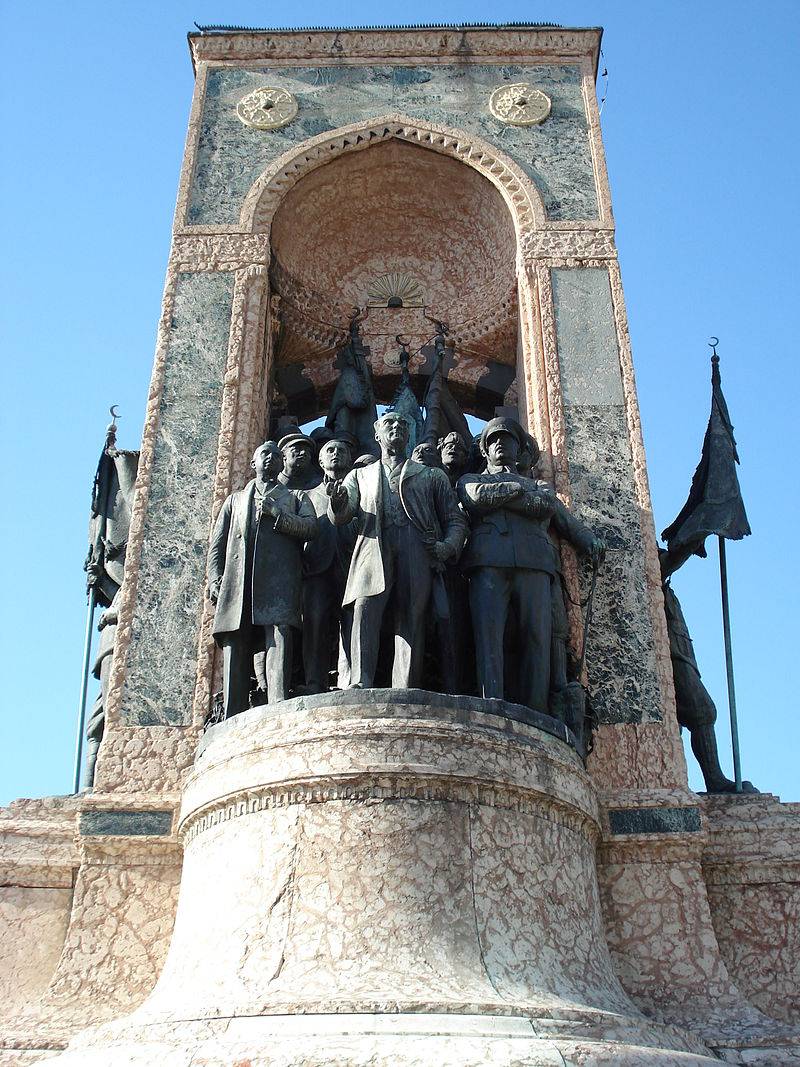
Republic Monument at Taksim Square, Istanbul
So, let's continue what we started in the article. Fall of the Ottoman Empire story about stories Turkey and let's talk about the emergence of the Turkish Republic.
War of Turkey with Greece
In 1919, the so-called Second Greco-Turkish War began.
On May 15, 1919, even before the signing of the Sevres Peace Treaty, Greek troops landed in the city of Smyrna (Izmir), the overwhelming majority of whose inhabitants were Christians.
In 1912, only 96 ethnic Turks lived here. And the Greeks - 250 243, Jews - 879 16, Armenians - 450 7 people. Another 628 people belonged to other nationalities. In Europe, this city was then called "the little Paris of the East", and the Turks themselves - "giaur-Izmir" (impious Izmir).
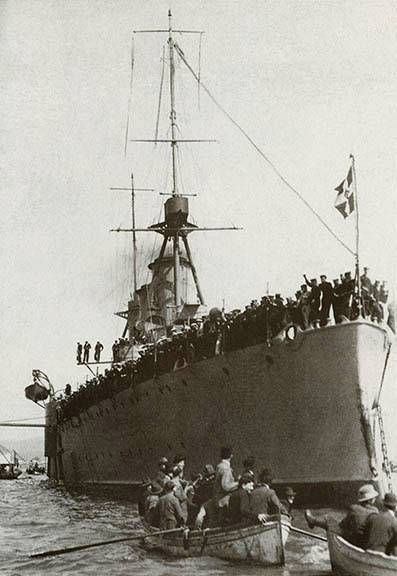
Greek battleship "Averoff" in Smyrna, May 1919
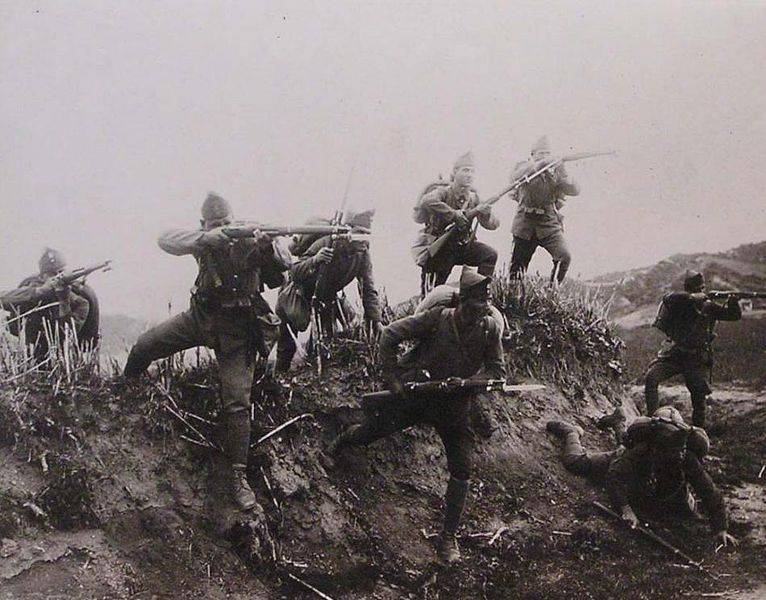
Greek infantrymen near the Gediz River, Western Anatolia
The Greeks, who hated the Ottomans, immediately turned the Turkish population against themselves by shooting the interned soldiers of the Ottoman army and reprisals against local residents. In the surrounding areas, partisan detachments began to be created, the resistance was led by Mustafa Kemal.
In June-July 1919, Edirne (Adrianople), Bursa, Ushak and Bandirma were taken by his troops. And cracks appeared in the relations of the victorious powers. At first, France refused to help Greece oriented towards the British, which now viewed Britain as a potential rival. And she did not want it to be strengthened in the eastern Mediterranean.
In October 1919, the king of Greece, Alexander bitten by a monkey, died of blood poisoning, completely controlled by London. His father, Constantine, who was known for his pro-German sympathies, ascended the throne of this country again: it was for this reason that he was forced to abdicate in 1917.
This immediately alerted the British, who also suspended military aid to the Greeks. However, when Mustafa Kemal Pasha moved his troops to Constantinople in March 1920, military assistance to Greece was resumed, the government of this country received permission to advance deep into Turkish territory.
The politicians of the great powers, who did not want to throw their own (tired of war) army units into battle, now allowed the Greeks to fight, who had old scores with the Ottomans. Kemal, as we remember from the article Fall of the Ottoman EmpireOn April 23, 1920, he was elected chairman of the Turkish Grand National Assembly and created his own government of the country, which was located in Ankara.
In January 1921, the Turkish general Ismet Pasha stopped the Greeks at Inenu.
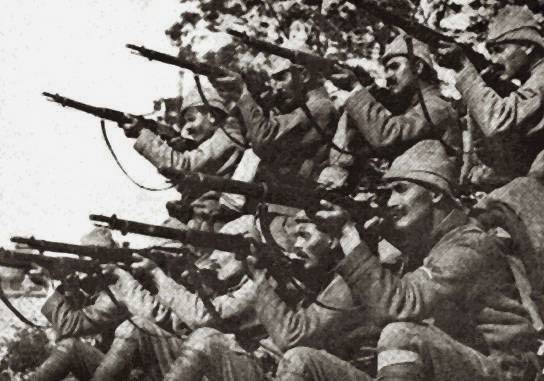
Turkish soldiers at Inonu
Ismet Pasha Inenu
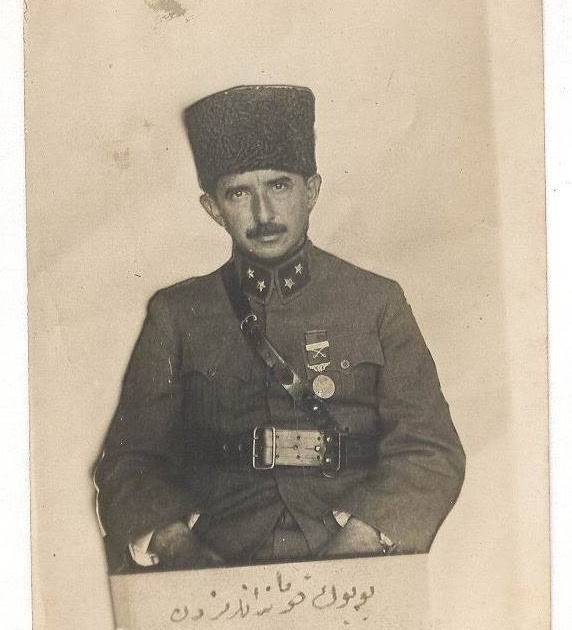
General Ismet Pasha, photo 1926
This Turkish politician and general was the son of a Kurd and a Turkish woman. In recognition of his services, in 1934 he received the surname Inenu. From March 3, 1925 to November 1, 1937, Ismet Inonu was the Prime Minister of Turkey, and after the death of Kemal Ataturk he became the President of this country. In this post, he did not allow Turkey to enter World War II on the side of Germany.
In 1953, Ismet Inonu was the leader of the opposition People's Republican Party. Upon learning of Stalin's death, the former president was the first to come to the Soviet embassy, writing in a book of condolences:
With the name of Stalin, this era was equally connected with your and our history.
In wars, our countries often fought with each other, and during the years of revolutions and immediately after them, we were together and helped each other.
But for this it is not necessary to make revolutions. "
Mustafa Kemal becomes "Invincible"
The second offensive of the 150-strong Greek army, undertaken in March, also ended in failure.
In March of this year, Italians decided to leave Anatolia. Kemal, on the other hand, concluded a treaty of friendship with the government of Soviet Russia, having received guarantees of the security of the northern borders.
The war, however, was just beginning, and it was accompanied by numerous casualties of the civilian population: the Greeks slaughtered the Turkish population of Western Anatolia, the Turks - the Greeks, of whom there were also many.
The next offensive against the Turks was led by King Constantine himself. The Greek army managed to capture western Anatolia at the cost of high losses, only 50 km remained to Ankara, but this was already the last success. The multi-day assault on the Turkish fortifications ("Battle of Sakarya" - from August 24 to September 16) was unsuccessful, the Greek troops suffered heavy losses. And they went beyond the Sakarya River.
For the victory in this battle, Mustafa received the title of Gazi - "Invincible" (in addition to the nicknames Kemal - "Smart" and "Savior of Constantinople").
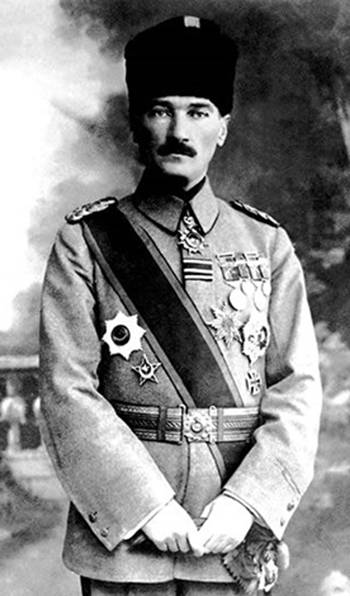
Mustafa Kemal Pasha, photo 1918
Soviet aid to the new Turkey
At that time, the Bolshevik government of Russia rendered great military and financial assistance to Turkey.
As you remember from the previous article, the situation was such that the existence of an independent and strong enough (to keep the Black Sea straits in its hands) Turkey was extremely necessary for Russia (and is still necessary). A total of 6,5 million rubles in gold, 33 rifles were allocated then. And also 275 million cartridges, 57,986 machine guns, 327 guns, 54 129 shells, one and a half thousand sabers and even two ships of the Black Sea fleet - "Alive" and "Creepy".
The Turks also returned gunboats, the crews of which took them to Sevastopol, so as not to surrender to the British. In addition, on a business trip to Turkey under the cover of a diplomatic mission in late 1921 - early 1922. The authoritative Soviet commander M.V. Frunze and the head of the Registration Department of the Revolutionary Military Council of the Red Army, one of the founders of the GRU S.I. Aralov. K. Voroshilov also went to Turkey as a military specialist.
The Berlin newspaper Rul wrote on August 14, 1921:
Note. Angora is the former name of Ankara in Turkey.
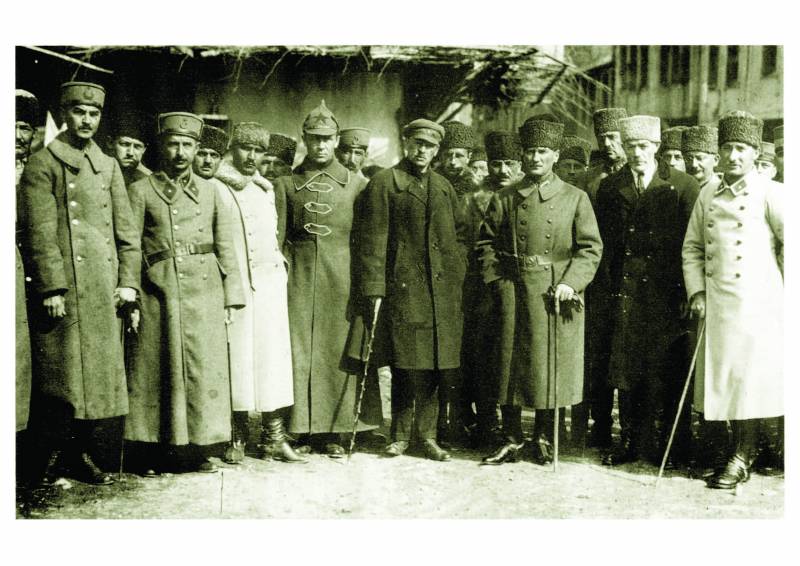
Mustafa Kemal, Ismet Pasha, plenipotentiary representative of the RSFSR S. Aralov and military attaché K. Zvonarev. In the vicinity of Konya during the preparation for the general offensive of the Turkish troops. March 23, 1922
Mustafa Kemal appreciated their help so highly that he ordered the sculptures of Voroshilov and Aralov to be placed on his left at the famous Republic Monument on Taksim Square in Istanbul. (This is the only sculptural image of Semyon Aralov. In the USSR, he never received a monument).
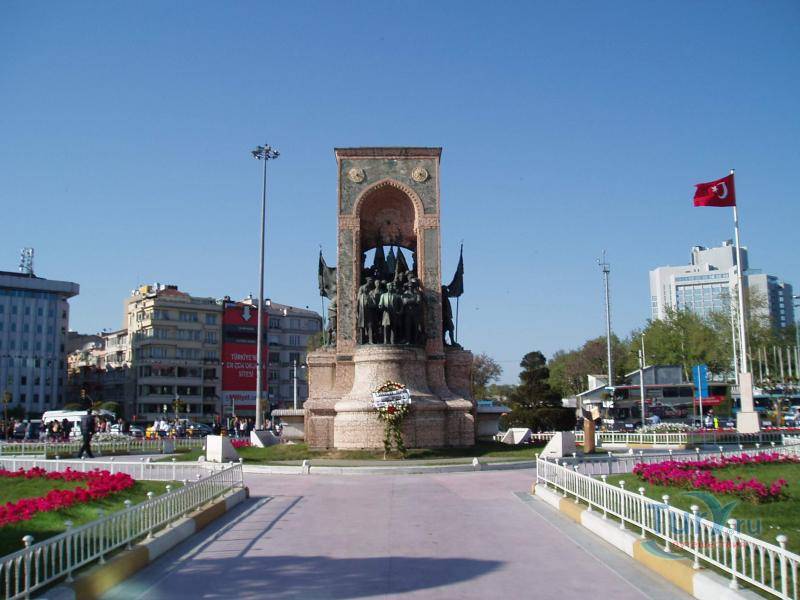
Taksim Square, Istanbul, Republic Monument
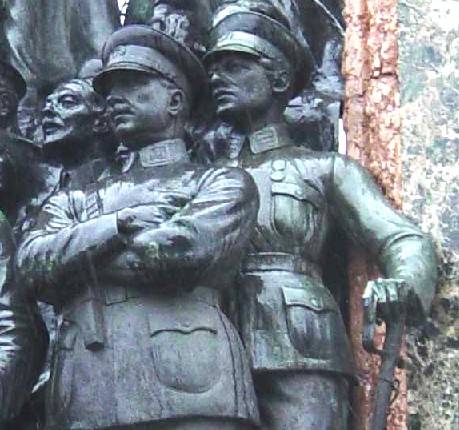
Sculptural images of Voroshilov and Aralov
The offensive of the Turkish troops and the Asia Minor catastrophe of the Greek army
On August 18, 1922, the Turkish army under the command of Mustafa Kemal launched an offensive.
The decisive battle of that war took place at Dumlupynar on August 30, 1922 (in modern Turkey, this date is analogous to our May 9).
Bursa fell on 5 September.
On September 9-11 the Greeks left Smyrna. About a third of the Greek army was able to evacuate on British ships.
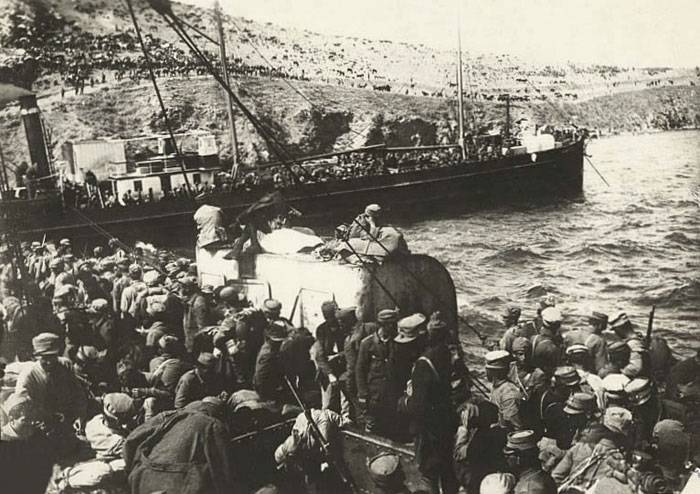
Evacuation of Greek troops from Smyrna in September 1922
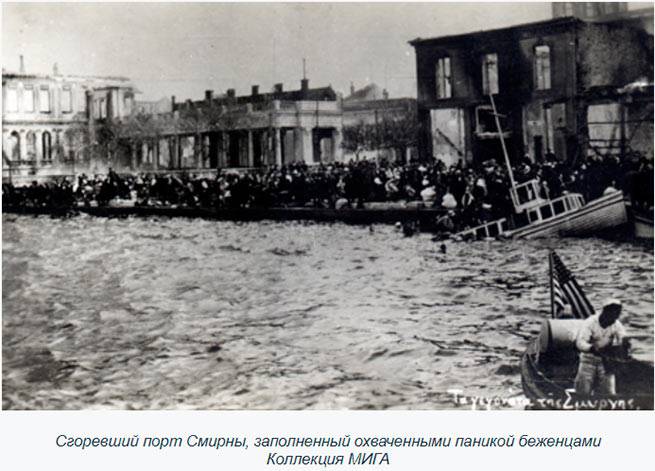
Christian refugees in the port of Smyrna
About 40 thousand Greek soldiers and officers were captured by the Turks. During the evacuation, 284 artillery pieces, 2 thousand machine guns and 15 aircraft were left.
Tragedy of Smyrna
This Turkish propaganda painting depicts the entry into Smyrna of Turkish troops led by Mustafa Kemal.
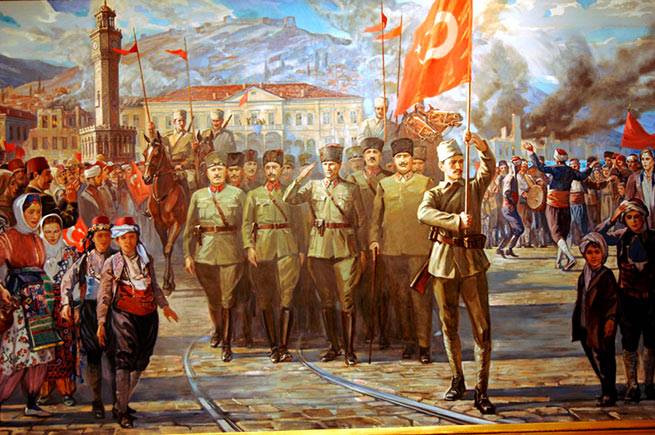
Turkish army led by Mustafa Kemal enters Smyrna
In fact, everything was far from so solemn and rosy.
In Smyrna, the Turks burned down all the churches and many buildings, and killed many Christians - Greeks and Armenians. The triumphant Turks tore out the beard of the captured Metropolitan Chrysostomos of Smyrna, cut off his nose and ears, gouged out his eyes, then they shot him.
But the Turks did not touch the Jews then.
All this happened to the music of Turkish military bands and in full view of the Entente warships in the harbor. Tens of thousands of Christians in the hope of salvation then gathered in the port of Smyrna. The Turkish authorities "graciously" allowed everyone (except for men of military age (from 17 to 45 years), who were subject to forced labor) to be evacuated from the city until September 30.
Overcrowded boats with desperate people sailed to foreign ships, the captains of which, as a rule, referring to neutrality, refused to board them.
The exception was the Japanese, who even threw their cargo into the sea to take on board as many people as possible.
The Italians also took everyone, but their ships were very far away, and few could get to them.
The French, according to eyewitnesses, accepted those who could address them in their language.
The Americans and the British pushed the boats away with oars, poured boiling water on those who climbed aboard and threw those who did find themselves on deck into the sea. At the same time, their merchant ships continued to take on board figs and tobacco.
Only on September 23, a mass evacuation began, during which it was possible to take out about 400 thousand people. By that time, 183 thousand Greeks, 12 thousand Armenians and several thousand Assyrians had died in Smyrna. About 160 thousand men were deported to the interior of Turkey, many of them died on the way.
The Christian quarters of Smyrna were on fire. The glow of the fire could be seen at night for fifty miles. And the smoke in the daytime was visible two hundred miles away.
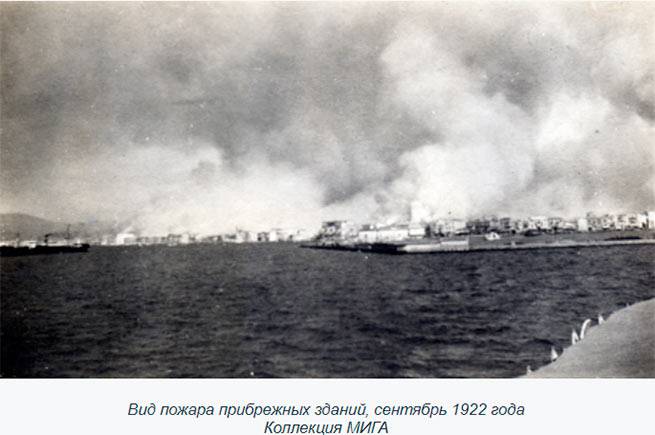
Fires in Smyrna, captured by the Turks, September 1922
By the way, Mustafa Kemal argued that the fires in Smyrna, which began in the Armenian quarter, were the work of refugees who did not want to leave their property to the Turks. And that in Armenian churches the priests called upon the abandoned houses to be set on fire, calling it a “sacred duty”.
From this quarter the fire spread to the entire city. Turkish soldiers, on the other hand, tried to fight the fires. But their scale was such that it was already impossible to do anything.
His words are confirmed by the French journalist Berthe Georges-Goli, who arrived in Smyrna shortly after those events. She reports:
This looks quite logical, since the Turks had no point in setting fire to the city they had inherited, which would then have to be rebuilt for a long time, spending huge amounts of money on it.
There are numerous examples of this behavior of refugees.
After Algeria gained independence, the "black-footed" Frenchmen leaving this country destroyed their houses and destroyed their property.
There have been cases of destruction of their homes by Israelis displaced from the Palestinian Authority.
Destruction of property and destruction of infrastructure are characteristic of retreating armies. While the attackers are trying their best to keep them. This was fully demonstrated by the Greeks, when retreating to the coast of the Aegean Sea, when they not only dealt with the Muslims they came across, but also destroyed factories, factories and even houses, so that about a million Turks lost their homes.
In Greece, the shock of this defeat was such that a riot began in the army. And King Constantine again abdicated the throne, giving way to his other son - George (he did not rule for long then - in 1924 Greece became a republic).
A rebellion broke out in the Greek army, Prime Minister Gunaris and 4 other ministers, as well as the commander-in-chief Hajimanestis were shot.
After that, about one and a half million Christians were expelled from Turkey, and about 500 thousand Muslims were expelled from Greece. These were not only ethnic Turks, but also Bulgarians, Albanians, Vlachs and Gypsies who converted to Islam. And at the same time 60 thousand Bulgarian Christians were deported to Bulgaria. The Bulgarian authorities, in turn, expelled from their country the Greeks who lived on the Black Sea coast.
Turkish Republic
After this victory, the Turkish army moved towards Constantinople.
And the politicians of the Entente countries, and, moreover, the soldiers of their armies did not want to fight at all.
Therefore, during the negotiations, which took place in Moudania from October 3 to 11, 1922, an agreement was reached on the return of Eastern Thrace and Adrianople to Turkey. The Entente troops left Constantinople by October 10.
On November 1, the troops of Mustafa Kemal entered the city.
On the same day, the last Sultan, Mehmed VI, will board the British ship and leave his country forever, who will be deprived of the title of Caliph on November 18.
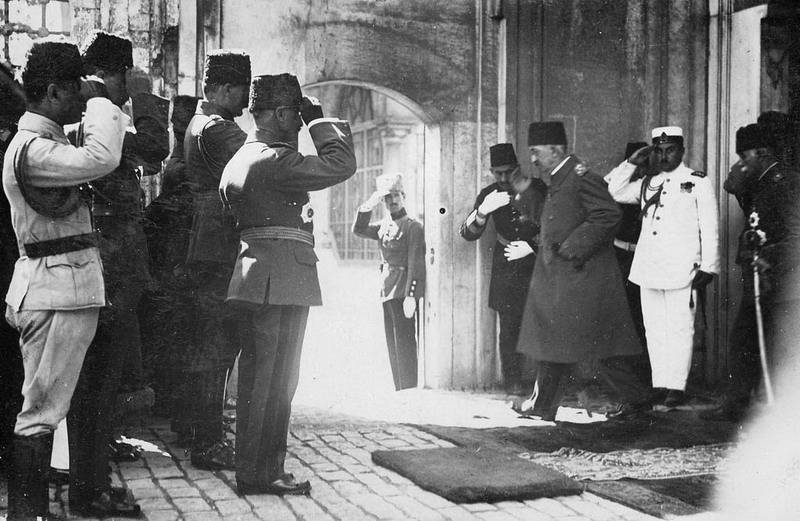
Sultan Mehmed VI, on the eve of his flight from the country, leaves the Dolmabahce Palace through the back door, 1922.
He died in 1926 in Italy. And he was buried in Damascus, becoming the only sultan whose grave is located outside Turkey.
Members of the Ottoman dynasty (in Turkey they are now called Osmanoglu) were expelled from Turkey. Members of this family were allowed to visit Turkey for the first time after their expulsion in 1974. And at the turn of the XNUMXth and XNUMXst centuries, they were given back the right to become citizens of this country.
But let's return to that turbulent time when the Republic of Turkey was born in blood and tears.
The Lausanne Peace Treaty signed on July 24, 1923 (which was signed on behalf of the Turkish government by the already familiar General Ismet Pasha) annulled the humiliating conditions of the Treaty of Sevres and established the modern borders of Turkey.
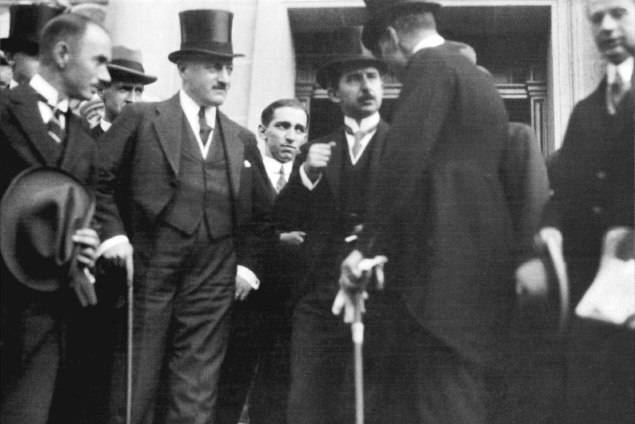
Ismet Pasha Inonu (center) in Lausanne
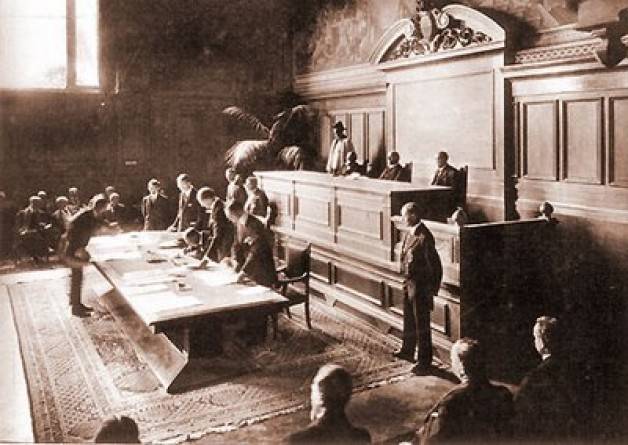
July 24, 1923, Lausanne Peace Treaty signing ceremony
Mustafa Kemal Ataturk
On October 13, 1923, Ankara was declared the capital of Turkey.
On October 29 of the same year, the Republic of Turkey was proclaimed, the first president of this country was Mustafa Kemal, who remained in this post until his death in 1938.
He stated then:
And in 1926, at the insistence of Kemal, a new Civil Code was adopted, replacing the previous legislation based on Sharia.
It was then that an anecdote appeared in Turkey from the auditoriums of the Faculty of Law of Ankara University:
Kemal also tried in every possible way to popularize dancing, which was very unusual for the Turks. Back at the end of the XNUMXth century, they were very surprised why Europeans do this "work" themselves, and do not make their servants dance.
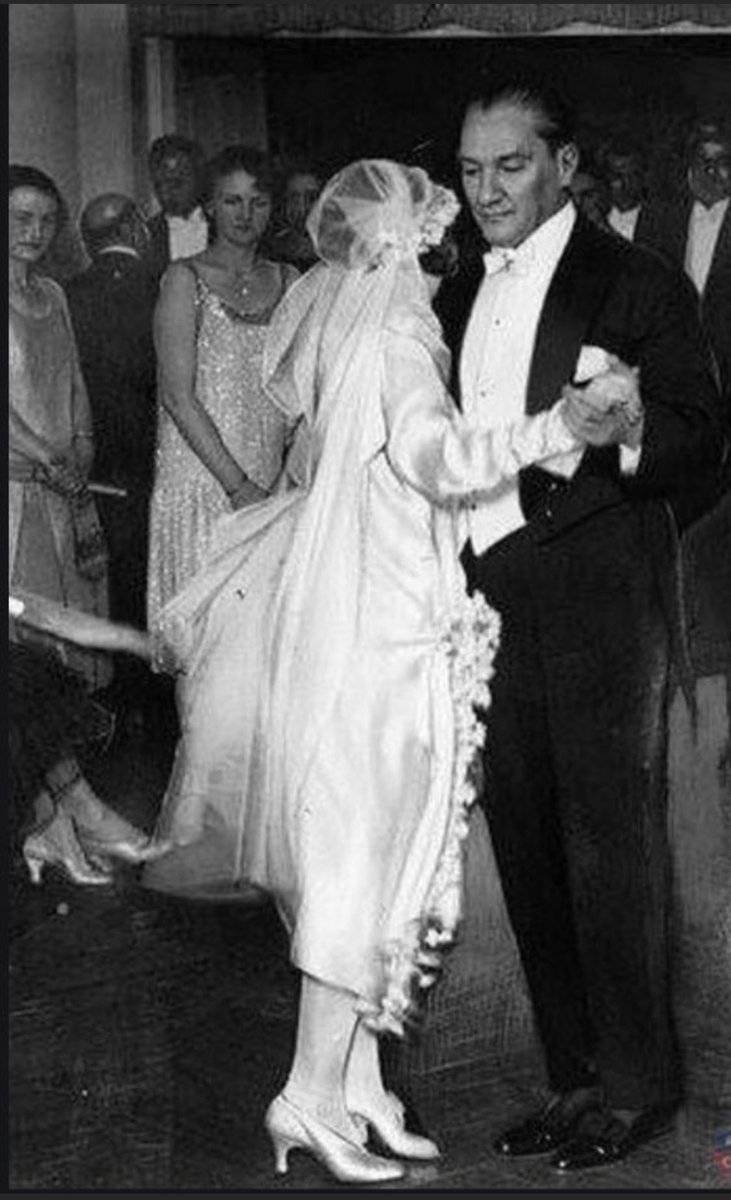
Gazi Mustafa Kemal and his adopted daughter
Mustafa Kemal was very popular in the army and traditionally relied on the officer corps (which was then the guardian of his traditions for many years).
Among the Kemalist officers then, by the way, it was considered the highest chic to publicly drink a glass of vodka and eat it with lard.
Therefore, officers also became the conductor of the dance culture. Especially after Mustafa Kemal stated:
It was the officer who became the main martyr of the ideology of Kemalism, when in 1930 Islamic fanatics sawed off the head of a certain Kubilai to the joyful shouts of the crowd surrounding them.
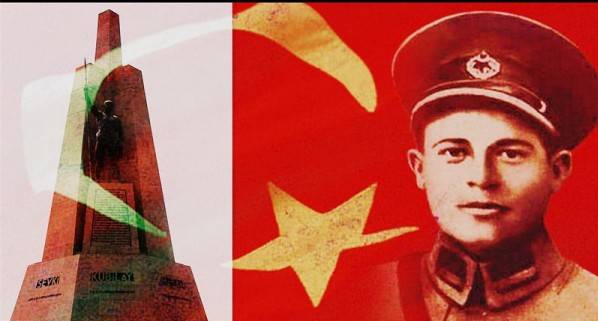
In 1928, Turkey passed a law on the separation of religion from the state.
The post of the first ulema of the state - sheikh-ul-Islam, was abolished, the madrasah at the Constantinople mosque of Suleiman, which trained the highest rank ulema, was transferred to the theological faculty of Istanbul University. The Institute for Islamic Studies was established on its basis in 1933. In the ancient Sofia temple, instead of a mosque, a museum was opened in 1934 (again closed and transformed into a mosque by Erdogan - a decree of July 10, 2020).
The traditional Turkish fez, which Kemal called
(It is curious that this headdress, which replaced the turban, was once perceived in Turkey as "progressive").
Banned in Turkey and the chador. Because, as Kemal said,
Sunday instead of Friday became a day off.
Titles, feudal forms of address were abolished, the alphabet was latinized (and the Koran was then translated into Turkish for the first time), women were granted suffrage.
Kemal tried in every possible way to promote the development of education and the emergence of full-fledged research institutes in the country. In Turkey, two of his sayings are widely known:
And also his famous second statement:
When in 1934 surnames began to be assigned to Turkish citizens (an unheard-of innovation in this country), Kemal became the "Father of the Turks" - Ataturk.
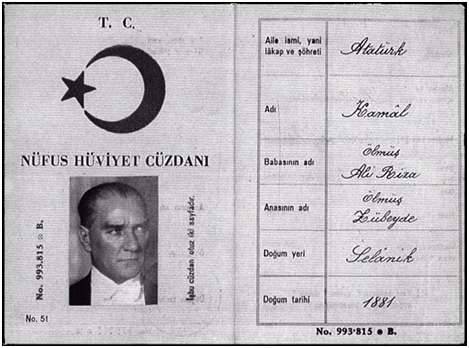
Mustafa Kemal Ataturk's passport
He did not have children of his own - only 10 adopted. (Kemal's adopted daughter, Sabih Gokcen, became the first female pilot in Turkey, one of the airports in Istanbul is named after her).
Dying, he donated his inherited lands to the Treasury of Turkey, and bequeathed part of the real estate to the mayors of Ankara and Bursa.
Currently, the image of Kemal Ataturk is on all Turkish banknotes and coins.
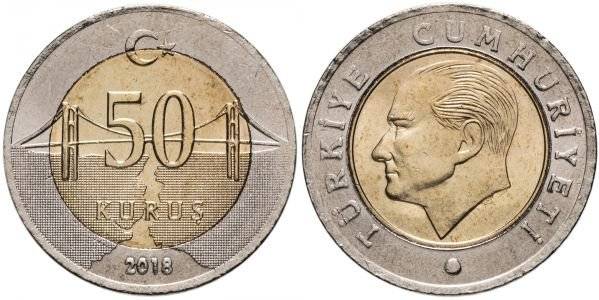
Coin 50 kurus
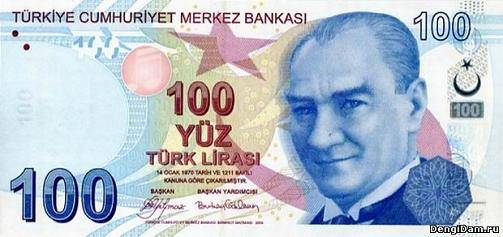
100 lire banknote
On November 10th every year at exactly 09:05 am in all cities and villages of Turkey, sirens are turned on. This is the traditional minute of silence in honor of the anniversary of the death of Mustafa Kemal Ataturk.
Blurring of Ataturk's legacy
However, one cannot fail to notice that in recent years Turkey has begun to deviate from the course indicated by Kemal Ataturk.
Many noted that Recep Tayyip Erdogan, after winning the 2017 Constitutional referendum, did not visit the mausoleum with the tomb of Ataturk (which everyone expected), but the tomb of Sultan Mehmed II Fatih (the Conqueror). It was also noticed that Erdogan avoids using the very word "Ataturk" in public speeches, calling the founder of the republic Mustafa Kemal.
In modern Turkey, Ataturk is no longer shy to criticize.
For example, Muhammad Nazim al-Kubrusi - Sheikh of the Naqshbandi Sufi order (of which Erdogan was once a member) said in an interview интервью
The idea of the greatness of the Ottoman Empire, the wise and brave sultans, about whom the famous TV series "The Magnificent Age" was filmed, is being actively introduced into the popular consciousness.
And in 2017, another series was released - "Padishah", the hero of which was the Ottoman Sultan Abdul-Hamid II, who lost Serbia, Montenegro, Romania and Bulgaria and was overthrown by the Young Turks in 1909. (Among other things, during his reign there were large-scale pogroms of Armenians and other Christians in 1894-1896, 1899, 1902, 1905. In Armenia, he was called "Bloody").
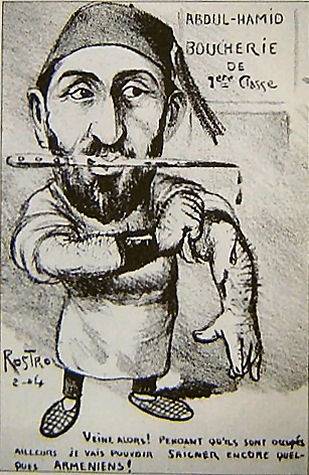
"Abdul-Hamid II - Executioner of Armenians", French cartoon
It seems hard to find a more compromised and unsuitable character for a patriotic film.
V. Polenov, who visited the capital of the Ottoman Empire, wrote:
This simple ceremony attracts a lot of public, especially tourists.
The local peculiarity is that during the procession, two pashas light the Sultan with perfume from silver bowls, which is understandable, because the natural Turkish aroma is very unpleasant for the sense of smell ...
When the Sultan goes, the soldiers, generals, ministers all shout:
"Great Sultan, reign for ten thousand years."
And when he drives up to the mosque, the court officials in uniforms, like our cameras-pages or clerks of the main headquarters, stand in a circle with their foreheads to each other, put their hands to their mouths in the form of a trumpet and wail in the manner of muezzins:
"Great Sultan, don't be so proud, God is still more noble than you."
However, they also tried to make a positive hero out of Abdul-Hamid II, presenting him as the last great sultan of the Ottoman Empire.
And other "signals" of the current Turkish authorities (the loudest of which is the restoration of the mosque in the St. Sophia Church) give grounds to speak of their neo-Ottomanism, which many blame the project of the ruling Justice and Development Party "Build a New Turkey".
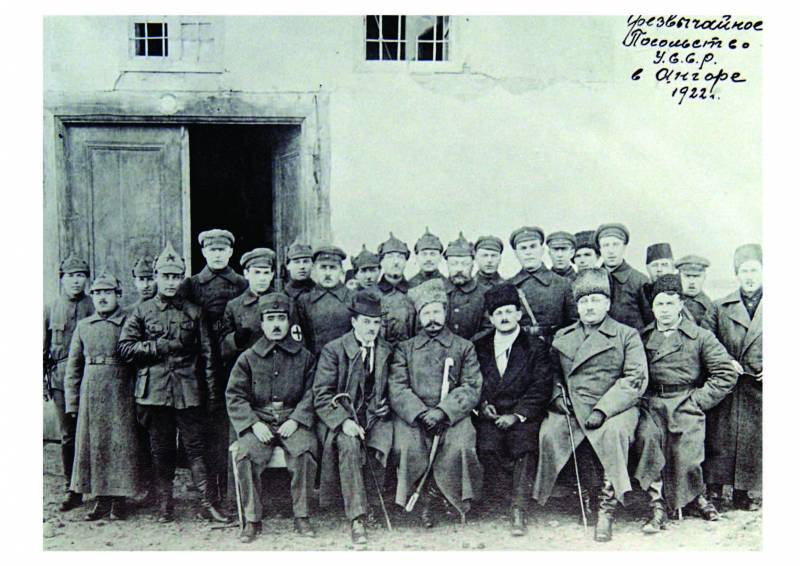
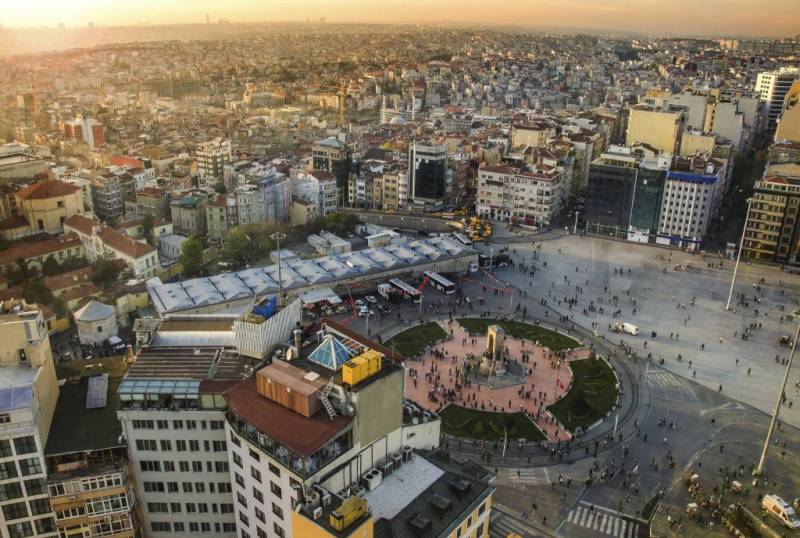
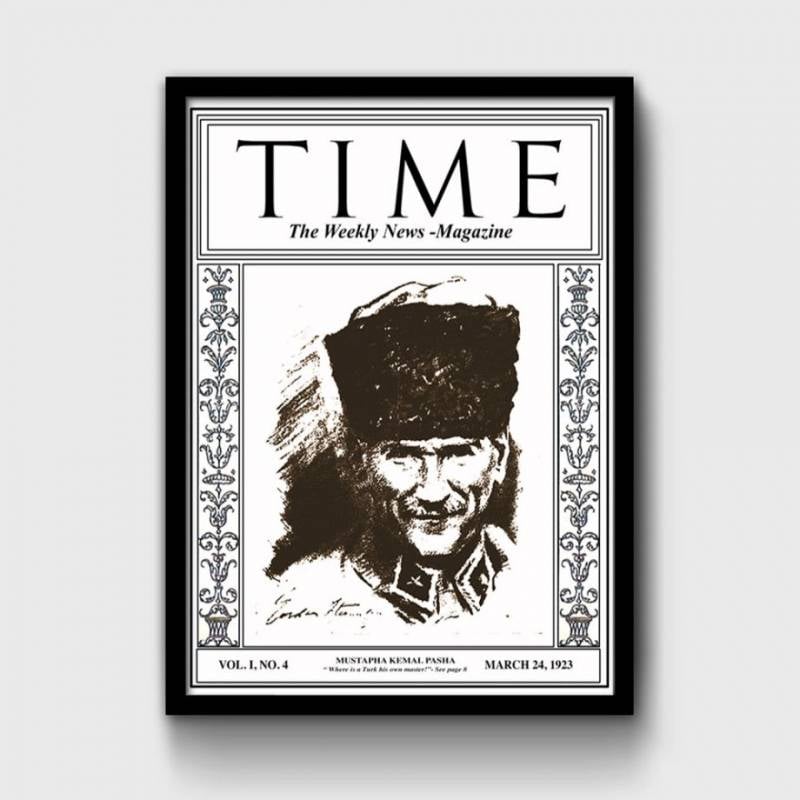
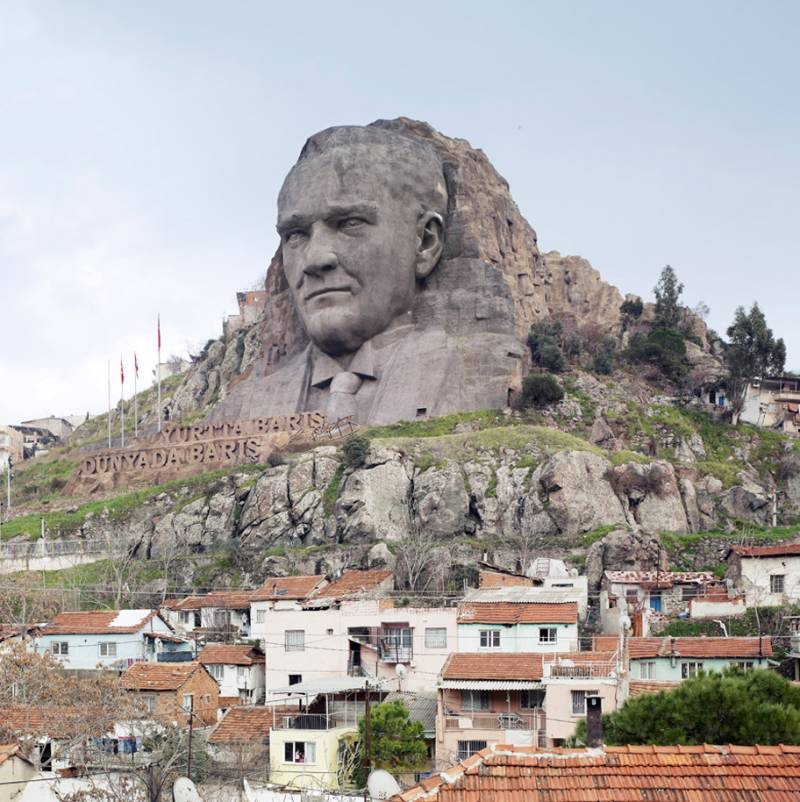
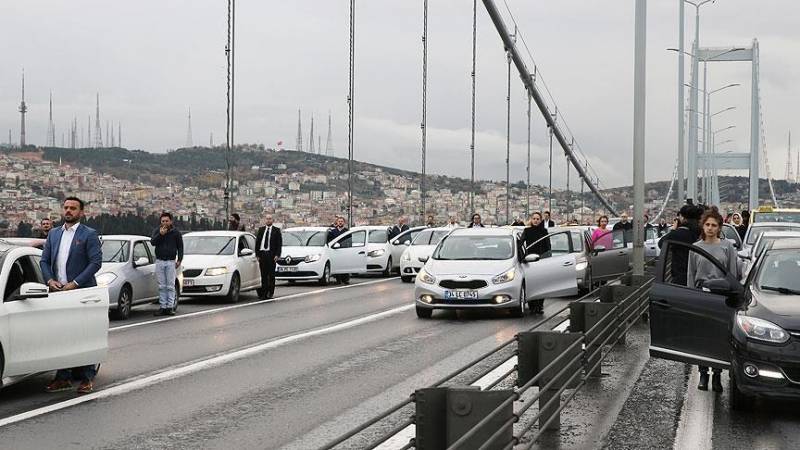
Information